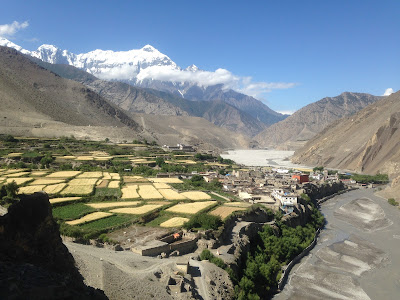Increase in tourist arrivels fails to boost trekking business
The Trekking Agents Association of Nepal (TAAN) has said that the number of trekkers has not increased as expected despite an increase in tourist arrivals. TAAN cited inadequate marketing and inability to compete with India and China in offering tour packages for the poor performance in attracting trekkers.
Although Nepal received a greater number of tourists during Nepal Tourism Year 2011 and the arrivals momentum kept up in the first quarter of 2012, there has been no matching growth in the number of trekkers.
“The number of tourists coming for trekking has not been so good as expected compared to the total arrivals,” said Rana Bahadur Khadka, first vice-president of TAAN. He added that trekking was one of the major tourism activities in the past years but it has remained stagnant presently.
Trekking agents blamed high trekking and mountaineering fees levied by the government compared to India and China which has made trekking an expensive adventure activity. Potential trekking visitors have thus dropped their plans to visit Nepal, they said. Trekking packages in Nepal start at US$ 70 per day.
Khadka said that the country was also lacking advertising and promotion to boost the adventure segment which India and China are doing recently. “The Indian government is providing tax waivers to entrepreneurs dealing with foreign exchange in the travel trade sector.”
Meanwhile, Arjun Prasad Sharma, immediate past president of the Nepal Association of Tour and Travel Agents, said that the number of trekkers has not dropped but has remained stagnant. “Increased options in leisure and other segments have affected the share of trekking in tourist activities,” Sharma said.
He added that Nepal had become a year-round destination for all activities due to improved peace and that the number of leisure and pilgrimage visitors had been growing. The number of tourists coming for leisure activities is shown by Indian and Chinese arrivals last year. “Visitors from both these countries are counted under leisure activities.”
TAAN said that spending by trekkers had also decreased along with their falling numbers. Normally, the length of stay of trekkers is 15 days.
According to a preliminary study of the Ministry of Tourism and Civil Aviation, arrivals reached an all-time high of 735,965 in 2011, but average daily spending dropped to US$ 39.90 last year from US$ 43.20 in 2010. Government statistics show that average spending has been dropping since 2008. If foreign visitors spent US$ 73.00 per day in 2008, they spent US$ 65.30 in 2009 and US$ 43.20 in 2010.
Trekking in Nepal is an all-season activity. It is possible at any time of the year depending on where one goes. However, the most popular seasons are spring (February-May) and autumn (September-November)
Although Nepal received a greater number of tourists during Nepal Tourism Year 2011 and the arrivals momentum kept up in the first quarter of 2012, there has been no matching growth in the number of trekkers.
“The number of tourists coming for trekking has not been so good as expected compared to the total arrivals,” said Rana Bahadur Khadka, first vice-president of TAAN. He added that trekking was one of the major tourism activities in the past years but it has remained stagnant presently.
Trekking agents blamed high trekking and mountaineering fees levied by the government compared to India and China which has made trekking an expensive adventure activity. Potential trekking visitors have thus dropped their plans to visit Nepal, they said. Trekking packages in Nepal start at US$ 70 per day.
Khadka said that the country was also lacking advertising and promotion to boost the adventure segment which India and China are doing recently. “The Indian government is providing tax waivers to entrepreneurs dealing with foreign exchange in the travel trade sector.”
Meanwhile, Arjun Prasad Sharma, immediate past president of the Nepal Association of Tour and Travel Agents, said that the number of trekkers has not dropped but has remained stagnant. “Increased options in leisure and other segments have affected the share of trekking in tourist activities,” Sharma said.
He added that Nepal had become a year-round destination for all activities due to improved peace and that the number of leisure and pilgrimage visitors had been growing. The number of tourists coming for leisure activities is shown by Indian and Chinese arrivals last year. “Visitors from both these countries are counted under leisure activities.”
TAAN said that spending by trekkers had also decreased along with their falling numbers. Normally, the length of stay of trekkers is 15 days.
According to a preliminary study of the Ministry of Tourism and Civil Aviation, arrivals reached an all-time high of 735,965 in 2011, but average daily spending dropped to US$ 39.90 last year from US$ 43.20 in 2010. Government statistics show that average spending has been dropping since 2008. If foreign visitors spent US$ 73.00 per day in 2008, they spent US$ 65.30 in 2009 and US$ 43.20 in 2010.
Trekking in Nepal is an all-season activity. It is possible at any time of the year depending on where one goes. However, the most popular seasons are spring (February-May) and autumn (September-November)
-co_20120414092903%5B1%5D.jpg)



Comments
Post a Comment